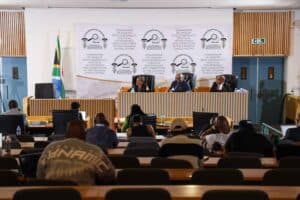Although government needs to cut costs, VAT increases and closing state programmes are preferred to ending SRD grants.

At a meeting in Stellenbosch earlier this week, National Treasury is reported to have told President Cyril Ramaphosa and his ministers that government will have to make drastic decisions if it wants to continue paying the R350 social relief of distress (SRD) grant.
If Ramaphosa and his government decides to keep paying the SRD grant, it will only be able to afford it by finding other ways to cut costs.
Among the proposals presented by Treasury are to increase value-added tax (VAT) or close dozens of state programmes.
In response, the Democratic Alliance (DA) has called for the government to be more transparent about its financial crisis.
ALSO READ: Defence ministry blames lack of funds for SANDF’s reduced ability to protect the country
Another proposal suggested to cut spending was to reduce the number of government departments. This would be done by either closing some departments or merging them with others, the Sunday Times reports.
Cutting government departments
It was suggested that the Department of Sport, Arts and Culture be incorporated into the Department of Basic Education. The Department of Tourism, meanwhile could merge with the Department of Trade, Industry, and Competition.
Also, the Department of Public Works and Infrastructure could close, meaning other government departments will have to manage their own assets.
Other departments that could be shut down are the Department of Women, Youth and Persons with Disabilities as well as the Department of Planning, Monitoring and Evaluation. They could both become divisions of the Presidency or merge with the Department of Social Development and Department of Public Service and Administration respectively.
The Government Communications & Information Services (GCIS) might also become a division in the Presidency.
Even though the reduction in departments could save government R17 billion, the proposal is expected to face resistance from some within the government and the ANC.
ALSO READ: Spending R1bn on Tottenham partnership deal not ‘justified’ – Ramaphosa
VAT increases
The increases in VAT, which would supplement the money needed to continue paying the SRD grants, would help relieve pressure on government, but it would add to the strain felt by ordinary South Africans.
Two options were given by Treasury. It projects that a 1% increase in VAT would raise R24.5 billion, while a 2% increase would generate R49.4 billion.
Ending government programmes
More than 100 government programmes could also be closed to enable the government to keep paying grants, the Sunday Times reports.
Among these are the Department of Social Development’s social assistance programme; the police visible policing programme; the Mine Health and Safety Inspectorate; civil aviation, the Department of Agriculture and Land Affairs’ food security programme; and the Department of Housing’s informal settlements support.
ALSO READ: 2023 Budget: Public servants to get R45.6 billion for wage increases
DA blames government’s ‘failed economic policy’
The DA’s Dion George said the meeting with Treasury is a sign that government is struggling to meet its promise to extend the SRD grant due to the “overoptimistic” projections by Treasury in this year’s budget speech.
George said the DA raised concerns that Finance Minister Enoch Godongwana’s budget speech did not say how the SRD grants would be paid after April 2024.
“In response, government stated that a revised social security model was being designed, followed by silence. This meeting may well be part of a desperate scramble to find money to fund an extension of the grant and also to plug the massive gap between projected revenue and actual revenue,” he said.
“The simple fact is that government has run out of money and cannot fund items budgeted in February, let alone the SRD.”
ALSO READ: ‘Social grants hike, R350 extension not a cause for celebration’ – Black Sash
George blamed the government’s “failed economic policy and poor fiscal choices” for the financial crisis it finds itself in.
“It appears that government is unable to make the hard choices that are required to keep South Africa financially afloat,” he said.






